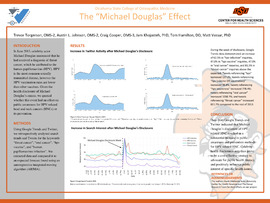| dc.contributor.author | Torgerson, Trevor | |
| dc.contributor.author | Johnson, Austin L. | |
| dc.contributor.author | Cooper, Craig | |
| dc.contributor.author | Khojasteh, Jam | |
| dc.contributor.author | Hamilton, Tom | |
| dc.contributor.author | Vassar, Matt | |
| dc.date.accessioned | 2020-05-05T19:38:03Z | |
| dc.date.available | 2020-05-05T19:38:03Z | |
| dc.date.issued | 2020-02-28 | |
| dc.identifier | ouhd_torgerson_michaeldouglas_2020 | |
| dc.identifier.citation | Torgerson, T., Johnson, A. L., Cooper, C., Khojasteh, J., Hamilton, T., & Vassar, M. (2020, Feb. 28). The "Michael Douglas" effect. Poster presented at Research Day at Oklahoma State University Center for Health Sciences, Tulsa, OK. | |
| dc.identifier.uri | https://hdl.handle.net/11244/324256 | |
| dc.description.abstract | Background: In June 2013, celebrity actor Michael Douglas announced that he had received a diagnosis of throat cancer, which he attributed to the human papillomavirus (HPV). HPV is the most common sexually transmitted disease, however the HPV vaccination rates are lower than other vaccines. Given the health disclosure of Michael Douglas's cancer, we queried whether this event had an effect on public awareness for HPV-related head and neck cancers (HNCs) or its prevention. | |
| dc.description.abstract | Methods: Using Google Trends and Twitter, we retrospectively analyzed search trends and Tweets for the keywords throat cancer, oral cancer, hpv vaccine, and human papillomavirus infection. We extracted data and compared it to an expected forecast found using an autoregressive integrated moving algorithm (ARIMA). | |
| dc.description.abstract | Results: During the week of disclosure, Google Trends data demonstrated an increase of 62.5% in hpv infection inquiries, 47.0% in hpv vaccine inquiries, 47.0% in oral cancer inquiries, and 81.5% in throat cancer inquiries above the expected. Tweets referencing hpv increased 127.2%; tweets referencing hpv (vaccine OR vaccination) increased 98.8%; tweets referencing hpv awareness increased 778.4%; tweets referencing oral cancer increased 1038.7%; and tweets referencing throat cancer increased 811.7% compared to the rest of 2013. | |
| dc.description.abstract | Conclusions: Data from Google Trends and Twitter indicated that Michael Douglas's disclosure of HPV-related HNC resulted in a substantial increase in public awareness and prevention methods for HPV-related HNC. Celebrity health disclosures may thus prove to be a cost-effective strategy to advocate for public health literacy, and positively influence public interest of specific health issues. | |
| dc.format | application/pdf | |
| dc.language | en_US | |
| dc.publisher | Oklahoma State University Center for Health Services | |
| dc.rights | The author(s) retain the copyright of have the right to deposit the item giving the Oklahoma State University Library a limited, non-exclusive right to share this material in its institutional repository. Contact Digital Resources and Discovery Services at lib-dis@okstate.edu or 405-744-9161 for the permission policy on the use, reproduction or distribution of this material. | |
| dc.title | "Michael Douglas" effect | |
| osu.filename | ouhd_torgerson_michaeldouglas_2020.pdf | |
| dc.type.genre | Presentation | |
| dc.type.material | Text | |
| dc.subject.keywords | michael douglas | |
| dc.subject.keywords | hpv | |
| dc.subject.keywords | head and neck cancer | |
| dc.subject.keywords | google trends | |
| dc.subject.keywords | public health | |
